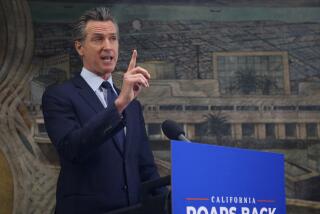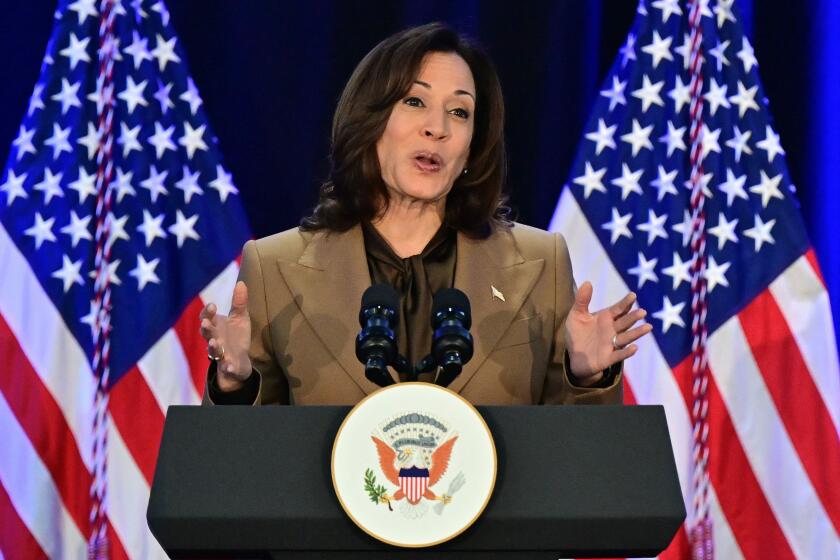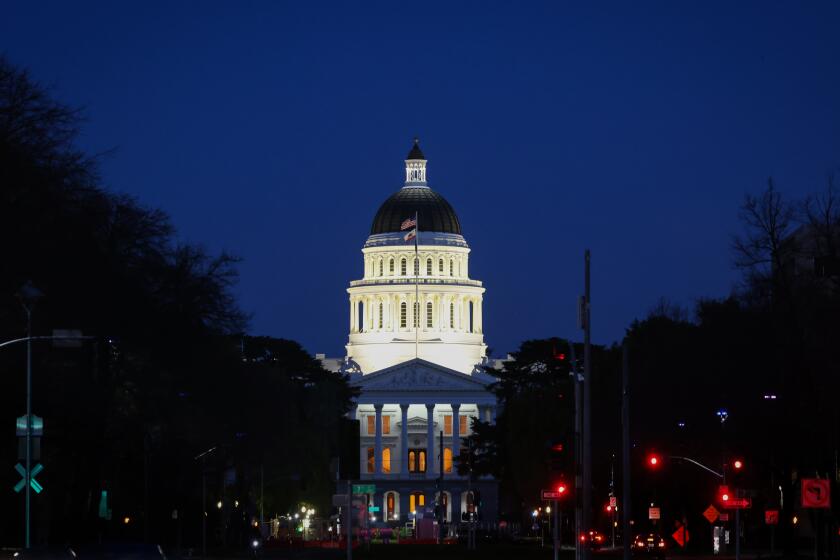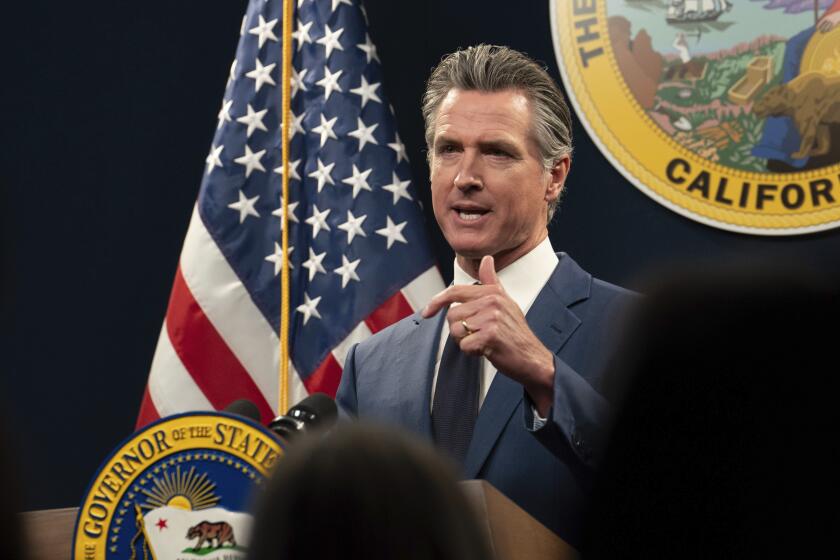Column: Newsom is admonished for his big-spending budget by Sacramento’s legislative analyst
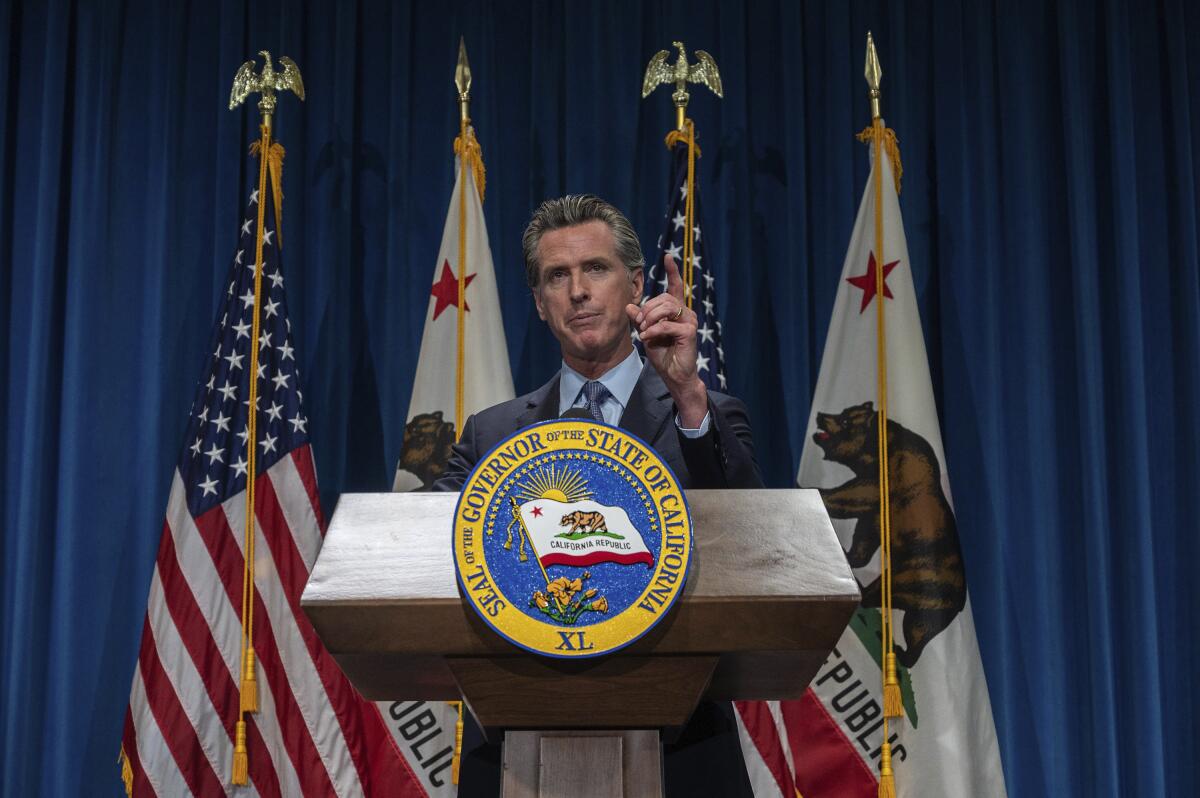
Gov. Gavin Newsom’s massive state budget proposal that he has been bragging about all over California is taking hard hits from Sacramento’s neutral referee.
Every contest needs an unbiased ref. And that role is handled in the state Capitol by the nonpartisan Legislative Analyst’s Office. No player is spared, including the powerful and pandered governor.
The analyst doesn’t have the final call on anything. That’s the prerogative of elected officials. But the office’s judgment on dollar amounts and preferred policy are highly respected and rarely attacked, at least publicly. No one takes political pot shots.
The analyst is appointed by the Legislature, but his allegiance is to facts and truth. He’s one source of insider information that can be fully trusted by the public.
Gabriel Petek, who formerly was Standard & Poor’s primary analyst for California, currently heads the Legislative Analyst’s Office. He has several deputies who are delegated to ignore the politicians’ spin and tell it straight.
Ann Hollingshead, a principal fiscal and policy analyst, delved into Newsom’s revised spending plan of nearly $268 billion for the next fiscal year — representing a 33% increase over the current budget enacted last June — and issued a critical report.
She concluded:
- The whopping $76-billion “surplus” projected by Newsom is actually only half that big. The other half is legally restricted and must be spent on schools, savings or debt repayment.
- Despite a record tax windfall, Newsom is still relying on $12 billion in savings and borrowing in order to jack up spending. “Shortsighted and inadvisable,” Hollingshead called it.
- The Legislature should delay approving all the money the governor wants to spend until it has time to think. It needs to plan how best to dole out the dollars efficiently and not rush the bureaucracy into wasteful spending.
The analyst didn’t mention the word “recall.” But if the Legislature followed her go-slow advice, all the money wouldn’t flow into the California economy — and voters’ pockets — before an expected fall election sought by Republicans trying to oust the Democratic governor.
Newsom’s decision to stick with the borrowing proposals is ‘shortsighted and inadvisable,’ a report from the Legislative Analyst’s Office says.
So, Newsom wouldn’t enjoy the maximum political benefit from Sacramento’s spending spree.
Meanwhile, both sides — Newsom and his opposition — are using the revised budget as political ammunition.
The governor’s campaign is running an internet ad touting the budget, declaring that “Gov. Gavin Newsom has California roaring back” — echoing what he repeatedly proclaimed all last week, up and down the state.
“Newsom is delivering money to your pocket,” the ad exclaims. “And free pre-K for every California child…. Gov. Newsom is just getting started.”
That should dispel any naive notion that politics isn’t a major consideration in the governor’s budget crafting.
Simultaneously, Republican recall activist Carl DeMaio of San Diego is using the “shameful” ad to raise money for a counter spot.
“Newsom is now trying to bribe voters with their own money,” DeMaio contends in an emailed fundraising pitch.
That’s a bit ugly.
But Newsom thrives on hyperbole and is obsessed, as I’ve previously written, with being first and best. He’s a braggart — even more so than most politicians.
Column: Newsom’s love of making firsts is on full display in his go-big-or-go-home California budget
Gov. Gavin Newsom whirled around the state last week unveiling one big-bucks program after another as part of his $100-billion “California Comeback Plan.”
“This is a generational budget — a historic budget,” Newsom declared incessantly in his weeklong rollout of the proposal. “This is unprecedented in the history of America.”
By comparison, the Legislative Analyst’s Office is refreshingly bland.
The conflict over the surplus size is about semantics, not math.
I asked Hollingshead: What difference does it make how the restricted money is described?
“No practical difference,” she said. “It’s just about the way the budget is characterized and understood.”
There’s $38 billion in discretionary play money and another $38 billion that’s restricted. And that’s what it should be called: restricted money, not surplus.
More problematic is using savings and borrowing to help fund a budget that clearly doesn’t need that money. Now’s the time to build up savings, not spend it — and to borrow zilch.
“Despite a historic surge in revenues, the governor continues to make use of nearly $12 billion in budget tools — reserve withdrawals and borrowing — to increase spending,” the analyst’s report asserts.
“Using tools designed for a budget crisis to support state spending at this time is shortsighted and inadvisable. The state will need these tools to respond to future challenges when federal assistance may not be as significant.”
The surplus does not include $27 billion in federal stimulus money that’s headed to Sacramento.
“We urge the Legislature not to take a step back from its track record of prudent budget management,” the analyst’s office wrote.
In truth, that prudence was forced on the Legislature by former Gov. Jerry Brown, a fiscal skinflint compared with the liberal Newsom.
H.D. Palmer, the governor’s budget spokesman, says Newsom has proposed saving $24 billion in various budget reserves.
“At the same time,” he adds, justifying the spending, “the state has not only immediate needs but well-defined infrastructure needs. We believe the [budget] revision strikes a proper balance.”
The Legislative Analyst’s Office also recommended delaying some of the spending for up to two years.
“This is an extraordinary amount of funding,” the analyst wrote. The bureaucracy’s “ability to allocate this funding in a timely and effective way likely will be significantly constrained…. Moreover, [the] departments’ ability to oversee this new spending likely will be limited….
“Delaying some spending decisions would give the Legislature more time to determine which solutions would be most effective and develop a detailed plan.”
What a concept: think, plan, spend efficiently.
In the state Capitol, the Legislative Analyst’s Office is not only the referee but also the MVP.
More to Read
Start your day right
Sign up for Essential California for news, features and recommendations from the L.A. Times and beyond in your inbox six days a week.
You may occasionally receive promotional content from the Los Angeles Times.

